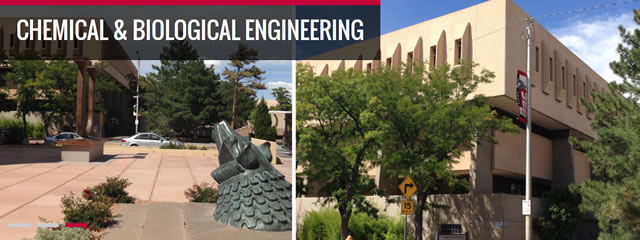
Chemical and Biological Engineering ETDs
Publication Date
8-27-2012
Abstract
Electrostatic filtration media (electret) has been used in many applications due to its ability to efficiently collect submicron particles while maintaining a low pressure drop. Filter face velocities have ranged from 0.01-0.5 m/s in previous studies. However, in this study, measurements were conducted from 0.5-2.5 m/s, a region where Reynolds numbers range from 0.05-0.24. Within this regime, commonly used filtration theory is incomplete and does not predict performance of electret media, therefore data must be measured. Experimental measurements were conducted in various combinations of charge and neutralized filter media with aerosolized particles possessing the Boltzmann charge distribution or zero charge. Collection efficiency of the charged FiltreteTM media was significantly higher than the FiltreteTM which had been charged neutralized. As filter face velocity increased, however, collection efficiency decreased in the electret media. As filter face velocity increased for the neutralized media, collection efficiency increased due to inertial impaction. Particle bounce was assumed to occur with particles of aerodynamic diameter \u2265 400 nm. Electrostatic attraction, i.e. Coulombic, polarization and image forces were analyzed based on experimental data. The Coulombic force had the greatest effect on efficiency at all three filter face velocities, followed by the polarization force. The effect of image forces was negligible for all three filter face velocities. This study provides unique empirical data outside of the viscous filter flow regime, data which is useful in the design of, and performance prediction of, high volume commercial and industrial applications, such as HVAC (heating, ventilation, and air conditioning) systems. The data presented can be used to validate' numerical models for filtration at moderate Reynolds numbers where data is scarce for electrostatically charged filtration.'
Keywords
Aerosol, Electrostatic Filtration, Submicron Particles, Particle Bounce, Neutralization; Electrostatic precipitation., Filters and filtration., Aerosols.
Document Type
Thesis
Language
English
Degree Name
Chemical Engineering
Level of Degree
Masters
Department Name
Chemical and Biological Engineering
First Committee Member (Chair)
Canavan, Heather
Second Committee Member
Hubbard, Joshua
Recommended Citation
Sanchez, Andres. "Experimental study of electrostatic aerosol filtration at moderate filter face velocity." (2012). https://digitalrepository.unm.edu/cbe_etds/38
